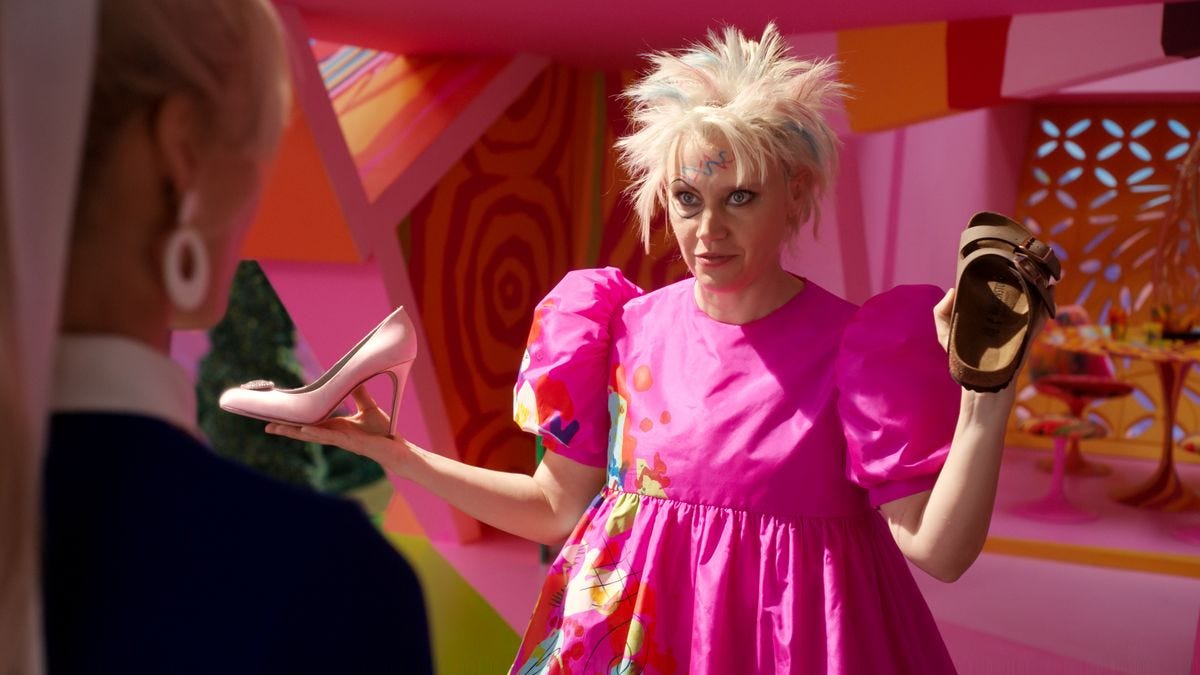For Barbie, The Winning Move is Not to Play
The toy-based film posits it's impossible to be a woman
I went to see Barbie with three mom friends (yes, I dressed up; no, I’m not posting our picture). On paper, the idea of a Barbie movie sounded bad (though not as bad as the threatened Uno movie), but I’d loved Greta Gerwig’s Lady Bird and Little Women. If she didn’t have something to say, I didn’t think she’d take the project.
Unfortunately, the Barbie movie winds up as a lot less than the sum of its parts. It’s not an empty, two-hour commercial—it brings up big, interesting questions but can’t muster substantive answers. I have a review of the film at The Dispatch today, and this is the core of my critique:
The film culminates in a narrow vision of womanhood—what it means to be a woman is simply being a target of misogyny. It’s a tidy answer, but it’s profoundly dissatisfying, suggesting there’s nothing good in being a woman (or a man, for that matter). […]
The message resonated with Hari Nef, a transgender actress who plays Doctor Barbie. In an Instagram post promoting the film, Nef said that the experience of being a woman badly is the most universal experience of womanhood. Nef and a group of transgender friends call themselves “the dolls” because, as Nef explained, “underneath the word ‘doll’ is the shape of a woman who is not quite a woman—recognizable as such, but still a fake.”
As Gloria gave her cold-shower pep talk, telling Barbie after Barbie it’s impossible to be a woman, I wondered if the transgender theorist Andrea Long Chu had a writing credit. (No.) In Females, Chu argues that everyone is female, because Chu defines femaleness as “a universal sex defined by self-negation.” “Put more simply,” Chu writes, “Everyone is female, and everyone hates it.”
The movie’s climax is keyed to the realization it’s impossible to be woman, and that what our society asks of women is undesirable, even if you could achieve it. I don’t think the film goes far enough in putting forward a different, positive vision, and it leave women’s solidarity as the shared experience of thwartedness.
There are some gestures in the direction of a better answer, but I think they’re drowned out by the dominant notes of the film. Still, I think the movie is more muddled than bad.
My favorite positive review is Helen Andrews’s for The American Conservative. I recognize parts of what she praises, though it feels like she saw a tighter edit of the film than I did!
Millennials are more likely to agree with Baumbach that the best thing about being young is that you get to be a grown-up at the end of it. Maybe it’s because we’ve been infantilized all our lives by our boomer elders. Whatever the reason, Barbie is a millennial director’s way of saying to the world now that her generation is hitting middle age: We are ready to put our toys away.
Of course, Mattel certaintly does not want viewers to feel they’ve grown beyond their toys, and, as Jessica DeFino points out at The Unpublishable, the Barbie tie-in products cut sharply against the ostensible message of the movie.
Among the official Barbie beauty collaborations is an anti-cellulite body lotion, $39, promising to “boost collagen and plump out creases” while “providing visible lift.”
(Of course, rather than explicitly use the words “anti-cellulite,” the body lotion product copy describes the physical characteristics of cellulite and how to “treat” it — e.g., “boost collagen” and “plump out creases” as well as “fine lines and wrinkles” to “leave skin plump” and “sleek.” These are all direct quotes! This is a not-uncommon trick in beauty marketing, particularly since the mainstreaming of body positivity movement.)
I’m still curious and optimistic to see what Gerwig will do when she gets her swing at Narnia. But if you want the good things that are subtextual in Barbie, I’d recommend watching Lady Bird instead.



For what it is worth... I love being a woman. Whatever my wins and losses in life overall, being a woman was one of the best parts of my life and I wouldn't trade it even if I could.
I haven't seen the Barbie movie yet... but one of the things I like about other feminisms is that this is one of the places where I feel we celebrate being women in all our glorious complexity without it being predicated on some need to always be in contrast, or worse conflict, with the masculine. This is a place where the message is being a woman is awesome! Thank you all for that.
The Barbie movie has the very same plot as The Velveteen Rabbit, and in that sense, is a positive message, I think. Barbie, like the Velveteen Rabbit, chooses to leave the silly games and dramas of being a toy for being real. And just as the Rabbit story hints that the Rabbit found love at the end after becoming real, so Barbie now has the capacity to be a lover, a wife, and a mother, as indicated by her final ob-gyn visit. Barbie has chosen to fully step into her real, female body, challenges and all, which desire is at the heart of all healthy forms of feminism. May her journey be blessed . . .